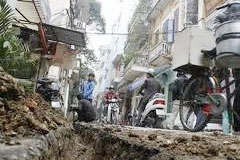Private finance a bridge to infrastructure
 The southern hub will need around VND300 trillion ($15 billion) to develop its transport infrastructure up to 2015. However, it could only source approximately VND8.5 trillion ($410.6 million) from state coffers every year, according to Ho Chi Minh City Transport Department deputy head Bui Xuan Cuong.
The southern hub will need around VND300 trillion ($15 billion) to develop its transport infrastructure up to 2015. However, it could only source approximately VND8.5 trillion ($410.6 million) from state coffers every year, according to Ho Chi Minh City Transport Department deputy head Bui Xuan Cuong.
Statistics show that for the southern growth engine to achieve 11 per cent per year economic growth from 2001-2005, it pumped over VND205 trillion ($10 billion) into investment development projects, of which VND38.6 trillion ($1.86 billion) was geared towards bettering transport infrastructure. Only 77 per cent of the capital demand was offset by budget capital.
The demand to lure private equity capital for the city’s transport development is tremendous and city authorities need to introduce a suitable mechanism to help private equity businesses recoup capital in an efficient manner, Cuong said.
That is why the Ho Chi Minh City Infrastructure Investment Joint Stock Company (CII) was founded a decade ago under city authorities’ instructions with 80 per cent of its equity raised from the community.
CII was recently trusted by the Ho Chi Minh City People’s Committee to act as investor of 995-metre Sai Gon 2 build-transfer (BT) bridge building project which is expected to significantly alleviate current traffic gridlock at existing Saigon Port and along arterial routes in the city’s eastern gateway.
Besides to the project, CII also executes many key infrastructure projects in the city such as building Rach Chieu bridge on Hanoi Avenue, expanding the Hanoi Avenue under build-operate-transfer (BOT) form, upgrading inter-provincial route 25B and second-phase Binh Trieu bridge and road project.
Most of CII projects are of great significance to Ho Chi Minh City development as they contribute to ameliorating traffic conditions in the city focal areas.
For instance, the inter-provincial route 25B would directly affect the city’s competitiveness in southern key economic zone since the road leads directly to Cat Lai port which handles 70 per cent of southern and 40 per cent of the country’s container transport market share, said the city’s Transport Department director Tran Quang Phuong.
According to a CII representative, the company will try its best to be able to finalise upgrading the road in early May 2012.
As scheduled, most of CII’s above-said projects will be finalised by 2014. Though carrying out these transport infrastructure projects CII helps ease the city’s budget burden with around VND10 trillion ($483 million) investment via diverse BOT, BT and capital advance contracts.
Reality shows that calling for private equity investment in infrastructure field not only helped quench the thirst for capital but gradually enhance the city’s investment environment.
What the stars mean:
★ Poor ★ ★ Promising ★★★ Good ★★★★ Very good ★★★★★ Exceptional
Related Contents
Latest News
More News
- Hermes joins Long Thanh cargo terminal development (February 04, 2026 | 15:59)
- SCG enhances production and distribution in Vietnam (February 04, 2026 | 08:00)
- UNIVACCO strengthens Asia expansion with Vietnam facility (February 03, 2026 | 08:00)
- Cai Mep Ha Port project wins approval with $1.95bn investment (February 02, 2026 | 16:17)
- Repositioning Vietnam in Asia’s manufacturing race (February 02, 2026 | 16:00)
- Manufacturing growth remains solid in early 2026 (February 02, 2026 | 15:28)
- Navigating venture capital trends across the continent (February 02, 2026 | 14:00)
- Motivations to achieve high growth (February 02, 2026 | 11:00)
- Capacity and regulations among British areas of expertise in IFCs (February 02, 2026 | 09:09)
- Transition underway in German investment across Vietnam (February 02, 2026 | 08:00)

 Tag:
Tag:




















 Mobile Version
Mobile Version